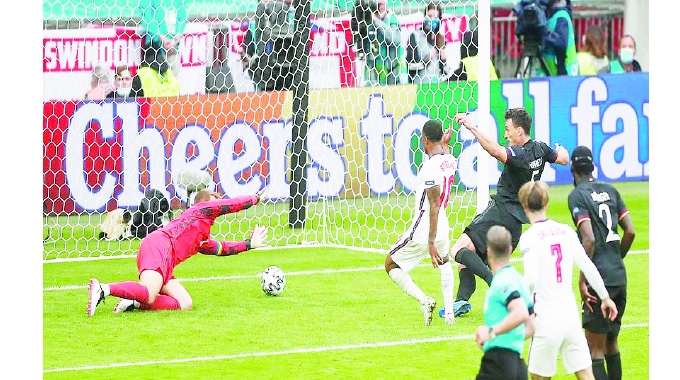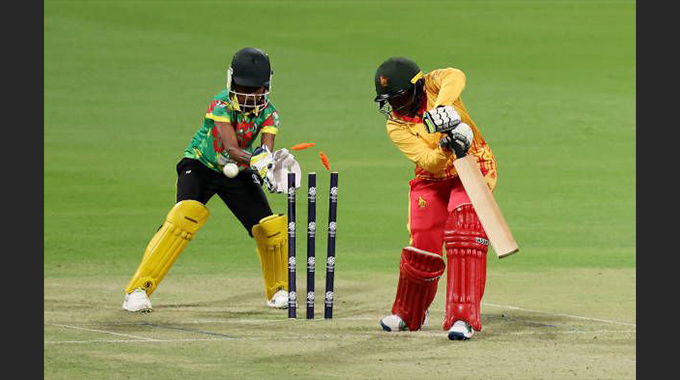Germany crash out

It is done. The mission, accomplished. England have beaten Germany in a knock-out match at a tournament, for the first time since 1966.
It is done. The mission, accomplished. England have won — actually won, not just progressed via penalties — a knock-out match at a European Championship tournament for the first time in the history.
But it is not done, of course. The mission is not accomplished. For once these hoodoos were banished, these landmarks set, the challenge is to take it further. To take it beyond the quarter-final in Rome on Saturday. To bring it back to Wembley. To bring it, as the song says, home.
But first, this. Undoubtedly, the highpoint of Gareth Southgate’s career as England manager, and possibly, a high point for English football this century, too. Have there been better England teams? Arguably. There was a golden generation do not forget. But they never displayed the gift of alchemy quite like this. Turning what had been a pretty base tournament to here into a nugget of sparkling wonder. A convincing, deserved win over the greatest rival, over a tournament favourite, a nation who have come to feel as comfortable at Wembley as the hosts.
England had Germany. That feeling was growing as the game went deeper into the second-half.
There were moments when Kai Havertz in particular looked capable of inspiring the opposition, but they were growing fewer. And then Southgate made the change the game, the crowd, the pundits, the millions at home, demanded. He brought on Jack Grealish.
It is not right to say that Grealish alone changed the game. Harry Kane scored one goal and was involved in another. Raheem Sterling scored his third in four matches. A victory like this belongs to all.
But, undeniably, Grealish played a part in England’s first goal. Undeniably, his cross made the second. Undeniably, England were energised by his arrival. It was a match-winning substitution, because it was when Grealish was on that the match was won.
What a wonderful goal, England’s first. Sterling began the move with another powerful run towards the penalty area. He laid it off to Kane, who found Grealish, who played in Luke Shaw on the overlap. His cross was perfection and there was Sterling to finish it off — the first player to score England’s opening three goals at a tournament since Gary Lineker.
The second was simpler, but no less important. Big for Grealish, bigger for Kane as his tournament opener.
The cross was on a plate, but Kane’s movement was outstanding, too. On the touchline, Jordan Henderson waiting to come on as a substitute, picked Southgate up by his boots, lifted him and wouldn’t let go.
Between the goals, a mistake by Sterling almost let Thomas Muller in to score. Had that gone in . . . who cares? It didn’t.
England have agonised enough about what might have been. This is about what was. A landmark victory.
The one that renders history bunk. All that history most of this team weren’t around for anyway.
It doesn’t take much to make an Englishman feel nervous against Germany but, even if it did, the first ten minutes here would have succeeded. It was one of those passages of play in which the Germans just look, well, smarter.
Not more technically proficient, just intelligent in their movement, their use of the ball, the way they operate between the lines.
Even with central defenders and two midfielders with a mission to protect, nobody seemed to know what to do with Kai Havertz and Thomas Muller. It was a rerun of the second half in Bloemfontein 11 years ago, when Germany’s wit left England nonplussed and the winning margin stretched to a humiliating level.
Leon Goretzka had a pop from range after four minutes that Jordan Pickford could have saved in his sleep but four minutes later the same player burst through and, approaching the edge of the area, forced Declan Rice to foul him.
Referee Danny Makkelie of Holland produced the game’s first yellow card and England massed a wall, vertical and horizontal, to repel a free-kick in a dangerous position. This it did, Rice’s boot keeping out Havertz’s strike.
Yet the innocence of youth got England back in the game. Did Bukayo Saka even notice how dangerous Germany were looking. If he did, he didn’t care. It was Saka, running at the opposition, that sparked England to life.
Others may have reaped the reward from his efforts, but it was his boldness that showed his team-mates what was needed.
England found a way in and, after 16 minutes, Raheem Sterling had the first chance, a cracking shot after cutting in from the left, tipped round by Manuel Neuer.
Matthias Ginter was booked for a foul on Luke Shaw and, with Kieran Trippier back in the side, the quality of England’s dead balls improved, too. The best cross of the half, though, came from Kalvin Phillips, struck perfectly from the right and met by Harry Maguire, who should have done better with his header, which flew over.
Germany were on the back foot, but always a danger counter-attacking. In the 32nd minute, their two Champions League winners from Stamford Bridge – England have three from the same club, all on the bench — combined for their best chance of the half. It was a lovely ball from Havertz that put Timo Werner through, but Pickford was alert to it and came out to save at his feet. — Daily Mail










Comments